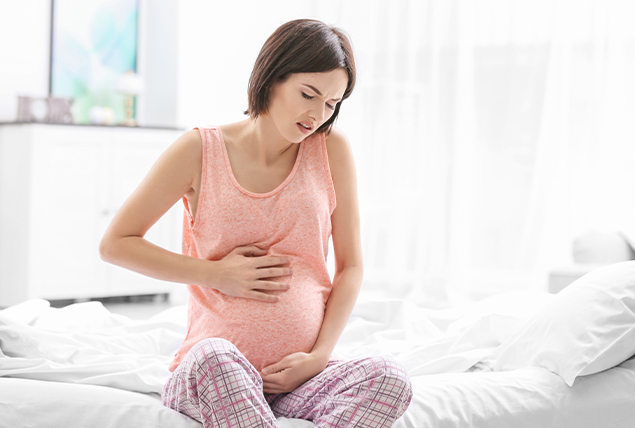The Painful Truth About Pregnancy Orgasms No One Ever Tells You About

Key Points
- Pregnancy can be a time of increased sensitivity and sexual desire due to hormonal changes.
- Researchers suggest there is a potential connection between sexual activity and the onset of labor, particularly in the last week of pregnancy.
- Avoiding intercourse or orgasm-inducing activities until after delivery might be considered by those who are pregnant.
You may feel being pregnant is one of the sexiest times of your life, and while it can be, it's a little-known fact that the contractions associated with orgasm can actually cause pain.
Some people recommend orgasms and sex during pregnancy to relieve stress and increase the bond with your partner. As your hormones run wild, blood flow increases and your breasts grow larger, you'd think that was the perfect time to be intimate.
The reality, however, can be very different for some women.
They may be great in the moment, but orgasms can cause your womb to contract. While this is not dangerous, it can be painful, especially during pregnancy.
An association has been found between sex in the last week of pregnancy and the onset of labor, potentially due to an increase in uterine contractions, according to a 2015 study. A previous study carried out in 2011 did not find a correlation between the two, however, so this correlation is still somewhat uncertain.
Dysorgasmia during pregnancy
Several factors associated with pregnancy can make sex uncomfortable, but painful orgasms are a specific phenomenon known as dysorgasmia, said Himali Maniar, M.B.B.S., D.G.O., an OB-BYN at Nisha Women's Hospital and IVF Centre in Ahmedabad, India.
"Dysorgasmia is characterized by intense uterine contractions and pain in the pelvis or lower abdomen experienced during or after an orgasm," she said.
Recommended
- Please Stop Believing These Pregnancy and Postpartum Inaccuracies: Lose a nipple? Sweat blue while pregnant? Misinformation is rampant on social media.
- FDA Approves First Pill for Postpartum Depression: The new drug can help to alleviate crippling depression in as little as three days.
- Why Every Woman Needs a Sex Manifesto: This sexual health roadmap helps you discover your wants and goals in the bedroom.
While this can be concerning on its own, it can add to the discomfort already experienced because of increased discomfort in their pelvic region due to hormonal changes and the growing uterus.
The uterine contractions associated with dysorgasmia during pregnancy are usually stimulated by the release of hormones such as oxytocin, also known as the "love hormone." It is more powerful during pregnancy, and that means contractions are stronger and more likely to cause discomfort, Maniar said.
Reasons for painful orgasms during pregnancy
Maniar noted this pain can happen for non-pregnancy reasons, such as pelvic floor dysfunction or endometriosis.
She outlined several potential causes for painful orgasms during pregnancy:
- Hormonal changes. The surge of hormones—progesterone and estrogen are most prominent—that occurs during pregnancy can lead to increased sensitivity or hypersensitivity to sensations associated with orgasm.
- Infections or inflammation. Conditions such as pelvic inflammatory disease (PID), yeast infections or urinary tract infections (UTIs) can all contribute to discomfort during orgasm.
- Pressure on sexual organs. As the baby grows, the uterus and other sexual organs may become pressed against nerves.
- Stress. The physical and emotional stress of pregnancy can cause tension and pain during orgasm.
On top of all this, the body simulates contractions or false labor pains during the third trimester, a phenomenon known as Braxton Hicks contractions, which are sporadic contractions that prepare the uterus for labor.
Sexual problems during pregnancy
It is common to experience some sort of sexual problem during pregnancy. This can range from anxiety to the inability to get into certain positions. Some women may feel too sick to engage in sex, especially during the first trimester.
"The most common things that I see women reporting is painful sex, low libido, inability to orgasm, lack of desire, and fear of sex because of hurting the baby or disrupting the pregnancy," said Kristin Mallon, R.N., certified nurse midwife and the co-founder of menopause treatment service FemGevity in New York City.
This can mean the thought of sex and orgasms leaves pregnant people afraid to experiment.
The increase in estrogen can cause painful sex (dyspareunia) whether a person has an orgasm or not. Mallon said the best way to deal with dyspareunia is to engage in more sexual activity and use silicone-based lubricants to reduce discomfort.
"As the body is adjusting to hormones and the hormones level out, the body will adjust to the increase in hormones and the symptoms will go away," she said, while acknowledging this may not work for everyone and that painful sex or orgasms can continue, but they typically go away after the baby is born.
Prioritize Safety and Comfort During Pregnancy Sex: Congratulations, you're pregnant! And no, that doesn't mean you should stop having sex. If your pregnancy is going smoothly and there are no health concerns that would warrant abstaining from sex, it is very likely any position or sexual act that feels good is on the table.
Treatments for painful orgasms
It's not always possible to eliminate uncomfortable orgasmic contractions altogether during pregnancy, but you may be able to manage them.
Certain methods can help reduce or eliminate the pain associated with orgasms during pregnancy, according to Maniar:
- Avoid sex or orgasm. If the discomfort persists despite other treatments, avoiding intercourse or orgasm-inducing activity until after delivery might be necessary.
- Get medical treatments. If the pain is due to infection or inflammation, treatments such as antibiotics or anti-inflammatory medications may be prescribed by your provider.
- Practice pelvic floor exercises. Strengthening the pelvic muscles using exercises such as Kegels can help reduce pain during an orgasm.
- Engage in relaxation techniques. The perinatal period can be stressful for many women, and relaxing activities such as pregnancy-safe yoga, meditation or deep breathing may help.
Addressing your concerns about sex during pregnancy
Of all the things people fear during pregnancy, being unable to have orgasms or sex is not typically one of them.
For couples who want to discuss the fears or practicalities about pregnancy sex, Heather Shannon, a Puerto Rico-based licensed clinical counselor and an AASECT-certified sex therapist, advised coming up with solutions that work for both of you.
"Get creative," she said. "There are a lot of ways to feel close and be intimate, so stay open-minded and keep as many options as possible on the table."
To kick off a potentially difficult conversation about sex, Shannon recommended the softened startup method, a technique created by the Gottman Institute. The method encourages a person to begin a conversation with a partner by stating a positive intention or something they already agree on. This can help reduce arguments and can be used for any discussions that may feel difficult or awkward.
When to worry about sex and pain during pregnancy
If you have concerns about sex, orgasms or any worrying symptoms—persistent cramping beyond one hour or spotting—during your pregnancy, you should contact your health team.
With some conditions, a person will be advised to avoid sex during pregnancy altogether. These could include placenta previa, cervical incompetence, a history of preterm labor, a twin or multiples pregnancy, high-risk pregnancies or if your waters have broken.
Otherwise, sex and orgasms are considered to be safe during pregnancy.


















